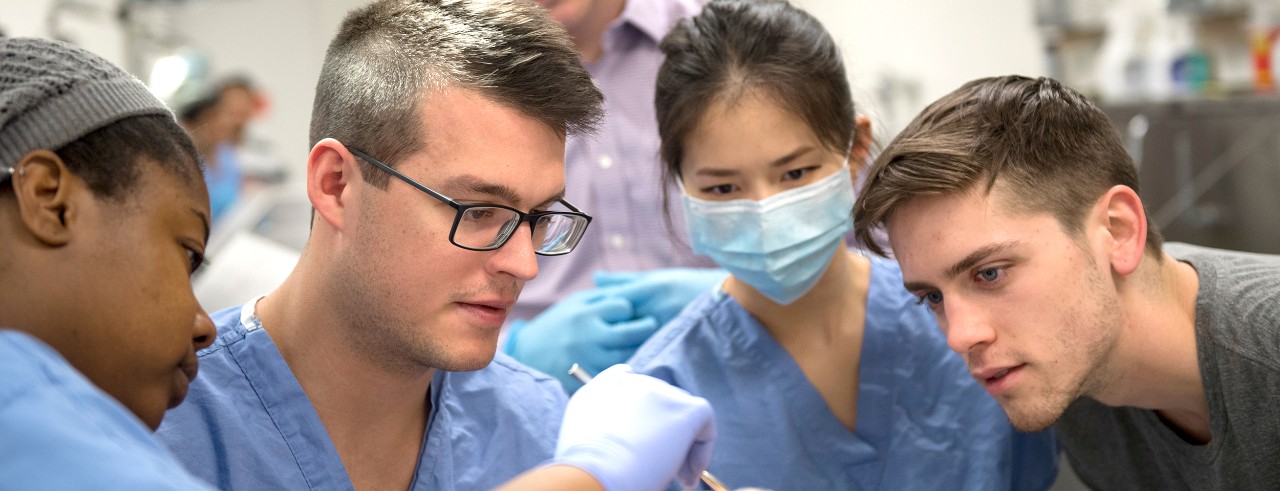
Medical students offer thanks at Oct. 13 service for body donors
Body donors among medical students best teachers.
CINCINNATI—Second-year medical student Farzaan Kassam wants to offer a message that conveys gratitude for an incredible gift.
"Someone choosing to share their body to assist our understanding of medicine as we become physicians is an incredible investment in our future,” says Kassam.
He is one of three medical students who will address the University of Cincinnati (UC) College of Medicine’s annual memorial service designed to honor individuals who have donated their bodies for medical education. The service is hosted by the college’s Body Donation Program and will be held at 11 a.m. on Saturday, Oct. 13, in Kresge Auditorium on the UC medical campus. The ceremony is open to the public and is held for the 190 individuals who will be interred at Spring Grove Cemetery.
"Body donors are supporting us throughout our education. I am where I am today because so many people around me have offered support and upon coming to medical school, we gained another valuable member of our support system. That’s the individual that gifted us their body to work with and that’s huge support for me. I don’t think my education would be as meaningful without it.”
Second-year medical students Iakovos Anastasakis and Carrie Heyd will also share reflections during the memorial service. The UC College of Medicine Student Chorus will perform, while remarks will also be offered by Bruce Giffin, PhD, professor and assistant dean of medical education in the College of Medicine, and by Patricia Brown, PhD, associate professor emeritus in the Department of Cancer and Cell Biology. Deena Maley, program coordinator for the Body Donation Program, will read a poem honoring body donors.
Laura Garrison, program director of the UC Body Donation Program says medical students have often credited body donors (also known as cadavers) as being among their best teachers during their medical education. Last year, the College of Medicine received 485 donor bodies, the largest number ever. The bodies are used to train medical students each year of their medical degree program, starting in year one with a gross anatomy course. Donors are also helpful in training nursing and physical therapy students along with aiding physicians in learning or teaching, adds Garrison, who will welcome family and friends of body donors to the memorial service.
"Our program has become generational,” says Garrison. "People are signing up because their parents or grandparents were part of the program.”

UC medical students in the College of Medicine's gross anatomy laboratory learn from body donors as part of their medical education.
Garrison says the Body Donation Program is known largely through word-of-mouth since there is no real solicitation for participants. She says the program has use for any individual who is pre-registered to make their contribution to medical education.
"We often have individuals who call us and think they are too old to donate their bodies for medical education, but I tell them our older donors make the best donors because they have lived so long for a reason and have much to teach our medical students,” says Garrison.
Garrison says body donors include all ages, demographic groups and socioeconomic groups. "I’ve got many doctors and nurses who contributed to the program, but also security guards and crossing guards. I had a candy store manager who understood how important this is to help us train our future physicians.”
Using cadavers remains an important part of the UC medical curriculum though many medical schools are opting for electronic dissectors, programs designed to mimic dissection of the body, explains Garrison. Body donors allow students to receive real hands-on experience.
Kasaam says medical students are taught from day one to handle donors in a manner that is respectful and to keep the body covered when not in use.
"There are people out there that love and have memories of this person so we always keep that in mind when interacting with our body donors,” says Kassam.
Garrison says the memorial service is helpful for many family members of body donors.
"Often people come into it and they don’t know what their loved one did and they weren’t always on board with donating the body, but after the service they are so at peace. You can see it on their face. It is an uplifting service; it’s not sad. Many of the families don’t know the relationship the students have with their loved one who has served as a body donor and an important teacher.”
More information about the UC Body Donation Program is available online or call 513-558-5612.
Related Stories
Achala Vagal, MD, appointed chair of Department of Radiology at...
July 11, 2025
The UC College of Medicine announces Achala Vagal, MD, as chair of radiology. A national leader in neuroradiology and stroke imaging, Vagal has 20-plus years of experience, advancing research, AI integration, mentorship and patient-centered innovation.
Understanding resistance to targeted therapies in head and neck,...
July 11, 2025
MSN highlighted University of Cincinnati Cancer Center and Cincinnati Veterans Affairs Medical Center research published in the journal Oncotarget that reviewed current research on why Epidermal Growth Factor Receptor-targeted therapies often fail in breast and head and neck cancers.
What parvovirus is and why it's on the rise
July 10, 2025
An infectious virus common in children is on the rise in the Tristate. The Cincinnati Health Department is warning of a rise in parvovirus in Hamilton County. The illness can present itself as a rash on the cheeks and is often called “slapped cheek” disease but can present more serious concerns in pregnant women. Kara Markham, MD, professor of obstetrics and gynecology at the University of Cincinnati College of Medicine recently appeared on Cincinnati Edition on WVXU to discuss how parvovirus is transmitted, the risk of serious cases and how to prevent it.
